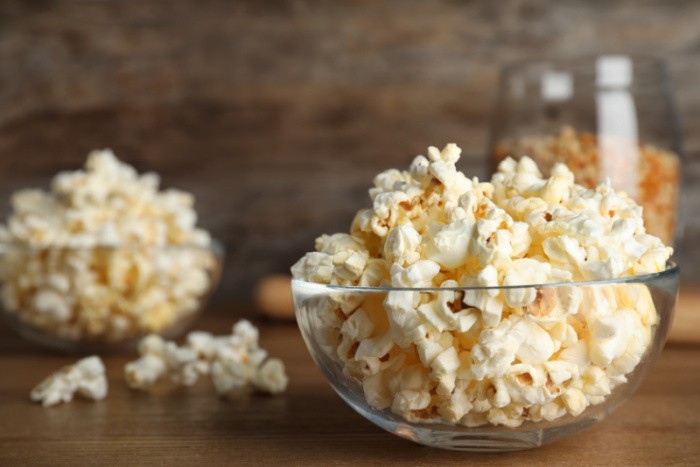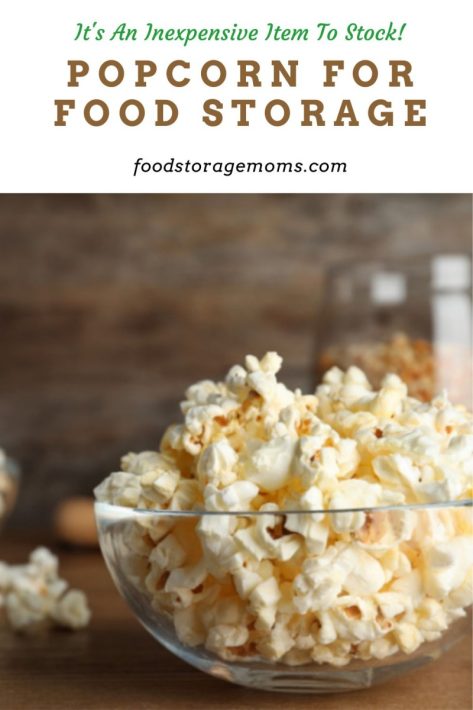
Have you ever heard of popcorn for food storage? Let me ask you something for those who have already been stockpiling food for emergencies. Have you ever thought about storing popcorn in your pantry for your family to have on hand during a crisis?
If not, you should consider it. Not only is popcorn a healthy snack that can be enjoyed in several ways, but it’s also a non-perishable food item with more unique uses than you may realize. Please keep reading to learn more about popcorn and why you must start stocking up on it today! Popcorn: Everything You Need To Know
Popcorn Popper

Storing Popcorn
Despite the expiration date on the packaging, popcorn stored in an airtight container away from moisture and direct sunlight should last many years. Storing it in a cool, dry place in glass mason jars makes much more sense than in bags.
Unpopped popcorn kernels have a tough shell, which helps to keep them from going bad and from being eaten by vermin. Unpopped kernels are a great option for long-term food storage since they can last indefinitely and stay edible. While expired popcorn may not pop as well or be as fluffy as fresh kernels when popped, it’s still perfectly safe to eat.
Popcorn is Cheap
Another reason to get your hands on an ample supply of popcorn is that it won’t cost you too much. Popcorn is one of the cheapest snacks; you can purchase a large quantity without spending a fortune. A large tub of popcorn will only cost you between $15 and $25 and save you money over servings of other food storage items. Franklin’s Gourmet Popcorn and regular Orville Redenbacher’s Gourmet Popcorn Kernels and Mushroom Popcorn by Princeton Popcorn – Farmer Direct, Non-GMO, Gluten Free.
Azure Standard sells non-GMO popcorn in 50-pound bags, but I’m not sure how much the shipping would be. Walmart.com sells 25-pound bags. Be sure to check out every option that works for you.
I remember buying a case of popcorn in six #10 cans for about $40.00 (currently out of stock), and the price is now $86.00. Honeyville Grain
Takes Up Little Storage Space
Besides the benefit of costing you very little out of pocket, popcorn takes up very little space when stored, so it’s easy to fit in your pantry or storage area. You don’t have to buy pre-made popcorn; popping it yourself can be a fun family activity. Hearing that popcorn pop in the kitchen as you prepare to watch a movie has been a tradition in American families for a long time. We tend to put too much butter on our warm popcorn, turning it into yellow popcorn.
Nutrition Benefits of Popcorn
In addition to its long shelf life, non-perishable nature, and tasty treat, popcorn offers impressive health benefits. It is considered 100% whole grain, which means it contains vitamins and minerals like iron, magnesium, phosphorus, zinc, manganese, potassium, and thiamin.
It also includes more fiber than most other snacks while being low in calories, depending on how much butter you put on yours. Eating popcorn can help reduce cholesterol levels, lower blood sugar levels, and even prevent certain types of cancer. With that said, all these nutrients make popcorn an ideal snack choice for maintaining good health, especially during an emergency.
Popcorn is Gluten-Free
Do you know someone who is allergic to gluten? If you’re looking for a gluten-free snack to have on hand in your pantry, popcorn is it. As long as you check the labels and ensure no added ingredients contain wheat or gluten, your popcorn should be safe for those with celiac disease or sensitivity to wheat. So it’s safe to say that popcorn is a great go-to snack whenever you have guests or the neighbor kids over. How To Make An Easy Gluten-Free Bread
A Versatile Snack
Popcorn is an incredibly versatile snack that can be enjoyed in multiple ways. You can add different seasonings and ingredients to make unique flavors or enjoy the classic version with salt. Even if you don’t have butter on hand for topping your popcorn, you can still enjoy it by adding olive or coconut oil for flavor and crunchiness.
While this may sound a bit strange to you, popcorn tastes great in cookies, homemade bread, and even with your breakfast eggs! Sometimes, people use popcorn to bread fried chicken or as a substitute for croutons on their salad.
It Can be Ground into Flour
Hey, I told you popcorn was versatile! So, if you’re in a pinch and there’s no flour around, you can always use popcorn. Would it surprise you if I told you that popcorn flour tastes great when making cornbread? But you don’t have to take my word for it. During WWII, when wheat was in short supply, people would take 25% popcorn kernel flour mixed with 75% wheat flour to help stretch their ingredients. Talk about clever.
Remember that you should only grind what you plan on using because once popcorn has been ground, the shelf life is dramatically shortened. Popcorn for food storage comes in handy when you know it can also be used for flour. 13 Surprising Uses for Flour.
Popcorn Has Many Unconventional Uses
Besides being a tasty snack, popcorn is also an excellent choice for survival. Popcorn can be used as a tinder for starting fires. The inner kernel can easily catch fire from a spark and help start an intense flame.
Additionally, you can use popcorn to deshell other grains, such as beans or rice. Run the grains through a sieve with popcorn inside, and the kernels will separate from the husks. If you have an abundance of it, popcorn can help make all sorts of arts and crafts with the kids.
FAQs on Popcorn for Food Storage
Is popcorn good for long-term storage?
Popcorn is a good option for long-term storage because it has low moisture content and can last for years when stored properly. To prevent a stale taste or spoiling, store popcorn in an airtight container in a cool, dry place away from light, heat, and humidity. Additionally, periodically rotate your popcorn stock to ensure you’re consuming the oldest kernels first.
Can you use oxygen absorbers with popcorn kernels?
It is said that you should never use oxygen absorbers to store popcorn kernels. There is a high moisture level in popcorn kernels, which means botulism could grow. Source
What kind of containers should I use to store my popcorn kernels?
The best results will come from using airtight containers, which help the kernels retain their moisture content. You can use Mylar bags without oxygen absorbers, mason jars with quality lids, or plastic containers with airtight seals.
Some people like to store some of their popcorn kernels in the freezer. You need to try a test yourself, but many popcorn lovers say they pop better.
More to Check Out
- The Best Caramel Popcorn Ever
- What is Nutritional Yeast and How Do You Use It? (goes great on popcorn)
- What to Stock Up on for Winter
Final Word
As you can see, popcorn is a survival food your family can’t afford to go without. Not only is it tasty, but it’s also a versatile snack that’s great to have on hand in an emergency! Popcorn is an excellent source of nutrition, incredibly affordable, and can offer many helpful uses if you ever find yourself in a pinch. What did you find interesting about popcorn and its uses? I’d love to hear from you! May God bless this world, Linda
Copyright Images: Popcorn in Glass Bowl AdobeStock_245990313By New Africa
The post Popcorn for Food Storage appeared first on Food Storage Moms.
from Food Storage Moms
No comments:
Post a Comment